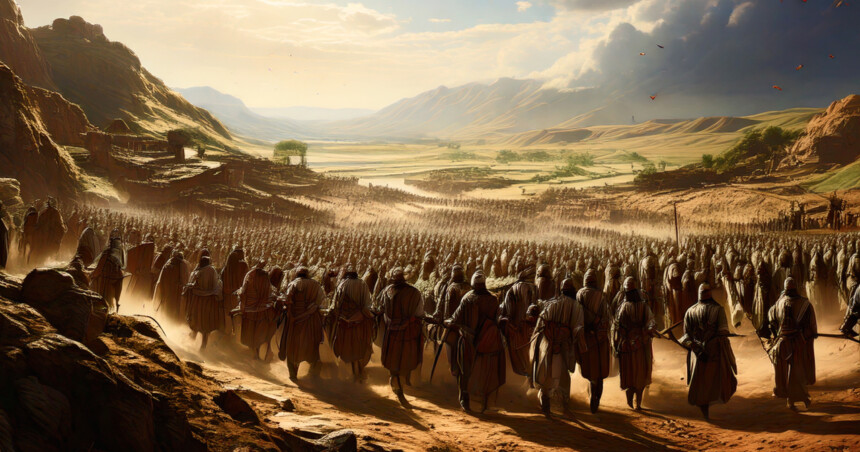In Islamic historiography, the Battle of Badr is a paradigmatic moment that reconfigured and continues to reconfigure communal identity through exemplary acts of valour and epistemic strength.
It has been extensively interrogated as various metanarratives for moral fortitude and unity in the face of existential adversity.
Modern role models a rarity
In our contemporary socio-digital landscape, we have few who can emulate historical exemplars of heroism.
Abu Ubaydah of Gaza and the Syrian whistleblower known as “Caesar” may be viewed as modern analogues to the archetypal warriors of Badr, to name two examples.
Indeed, when subjected to critical hermeneutic analysis, their actions show a fidelity to the epistemic values of resistance, ethical agency, and transformative praxis inherent in the Badri paradigm.
This juxtaposition makes necessary the re-articulation of normative frameworks for heroism, moving beyond superficial digital manifestations and cultivating a societal ethos capable of withstanding the transient allure of contemporary cultural signifiers.
Unsung heroes looking past the battlefield
The valour displayed during the battle is well-celebrated, but we need to acknowledge the continued contributions of Badr’s participants in the subsequent expansion and consolidation of the Islamic state.
These individuals became instrumental in spreading the message of Islam across various regions.
And here are a few names that we should learn more about:
al-Miqdād ibn Amr al-Kindī
The sole cavalryman at Badr, he later played pivotal roles in the conquests of the Levant, Palestine, and Egypt.
al-Nadr ibn al-Hārith
He participated in numerous campaigns and achieved martyrdom at the Battle of al-Qadisiyyah in Iraq — a decisive encounter against the Sassanian Empire that marked a turning point in Islamic history.
Ubādah ibn al-Sāmit
Esteemed for his dedication to education and justice, he taught the Qur’ān in Homs and served as the first judge in Palestine post-liberation.
He continued his scholarly and judicial duties until his passing.
Sa’d ibn Mu’adh
A chief of the Ansār, his leadership at Badr and support for the Prophet ﷺ played a crucial role in the consolidation of the Muslim community.
His death was so significant that the Throne of Allah trembled upon his passing!
Abu Dujāna
Known for his fearless defence of the Prophet ﷺ, he was the definition of self-sacrifice and loyalty — traits that defined Badr and later battles.
Allah says of those at Badr,
Yes, if you remain patient and conscious of Allah and the enemy come upon you [attacking] in rage, your Lord will reinforce you with five thousand angels having marks [of distinction].” [1]
And the Prophet ﷺ himself emphasised their unique status, saying,
Perhaps Allah has looked at the people of Badr and said,
We live in a time when superficial celebrity culture dominates, so remembering these true heroes and role models helps restore a sense of purpose and historical consciousness.
To embrace their example means…
Allah states,
And already had Allah given you victory at Badr while you were few in number.
Then fear Allah; perhaps you will be grateful.” [4]
In the test against contemporary occupation, the erosion of identity, and the relentless tide of oppression, we should keep Badr at the front of our minds.
Whether in the besieged streets of Gaza, the defiance of the whistleblower in Syria, or the untold acts of resistance across the Muslim world — be that in Kashmir, East Turkestan, and elsewhere — the warriors of Badr live on in these modern-day champions of truth and justice.
The marginalised need not cower beneath the weight of hegemonic forces, but rather can rise — undaunted and true to their faith.
Embracing their examples means finding the blueprint for our own steadfastness in a world that — as we know full well — constantly seeks to fracture our identity and erode our dignity.
It is for this reason that moral excellence and integrity must always be paramount in our lives.
Source: Islam21c
Notes
[1] al-Qur’ān, 3:125
[2] Sahīh al-Bukhārī, 3,007; https://sunnah.com/bukhari:3007
[3] Sahīh Muslim, 2,494; https://sunnah.com/muslim:2494
[4] al-Qur’ān, 3:123








Among all those names I only knew the Syrian Caesar and Al -Kindi… Please, might you post more often articles concerning Islamic history (and also Islamic philosophy) ? Thanks a lot.